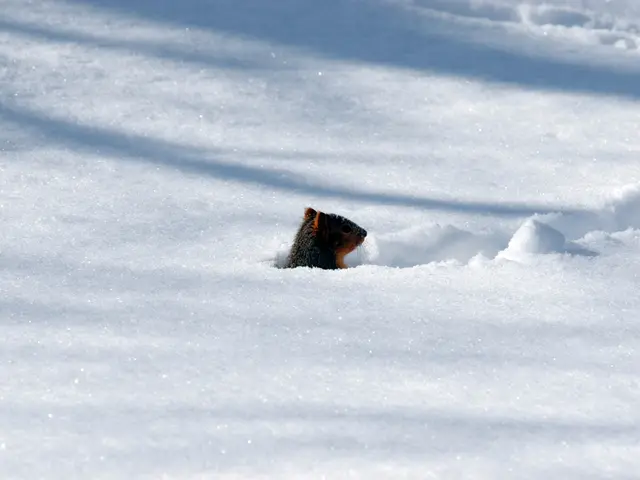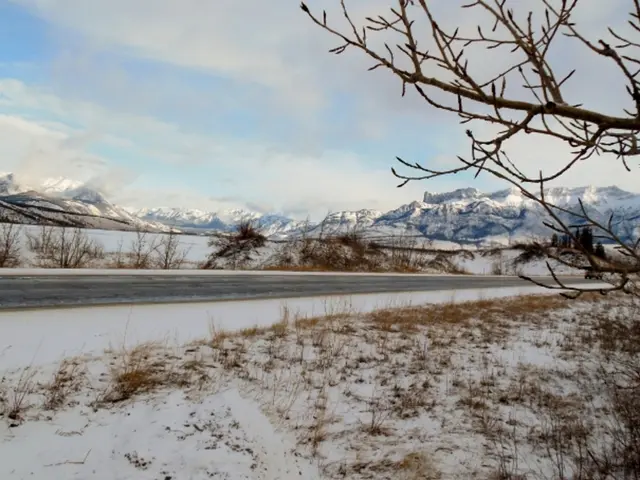Rainfall Woes Continue: Current State of Groundwater Reserves in Bavaria
Insufficient rainfall persisting in Bavaria remains a concern. - Decreased rainfall recorded in Bavaria region
Bavaria finds itself knee-deep in a water crisis, as relentless droughts loom over its landscape. Though recent showers promised relief, they've failed to stem environmental experts' concerns. According to the Bavarian Environment Agency in Augsburg, the past winter half-year - running from November to April - was unusually dry.
The hydrological winter half-year saw a scarcity of snow, a clear sign of the ongoing drought. Würzburg experienced only one day with a snow cover of at least one centimeter, with Augsburg registering four days and Munich six. In comparison, residents of Hof in Upper Franconia enjoyed a relatively normal winter with 34 snow days.
The reality of this drought is painfully evident on Germany's highest mountain, the Zugsipeitze. The German Weather Service station on the Zugsipeitze recorded a snow depth of 116 centimeters on May 5. Such a low "snow cover strength" had not been seen since 1942 when it was only 85 centimeters.
The critical groundwater reserves in Bavaria continue to remain below the mark. Scant rainfall over the years has prevented the formation of new groundwater. During the last winter half-year, nearly half of the shallow measurement points exhibited "low or very low values," while the deeper groundwater layers saw 41 percent of the measurement points with low water levels.
Experts are skeptical about a recovery of Bavaria's drinking water reserves. The situation in deeper groundwater levels has not improved significantly, with "no sustainable recovery" expected due to the current drought.
Hopes for the upcoming summer half-year are dim. Groundwater conditions must be assessed as unfavorable, as plants during the upcoming vegetation phase will cause more evaporation, further reducing available water for groundwater formation.
Groundwater, the primary reservoir for drinking water in Bavaria, is important. More than two-thirds of Bavarian drinking water comes from approximately 4,300 wells tapping into the groundwater, as per the Environmental Agency.
- Bavaria
- Drought
- Augsburg
- Environment
- Rainfall
- Environmental Agency
- Zugspitze
- Würzburg
- Measurement point
Insights
- Droughts and climate change can lead to decreased groundwater recharge and increased evapotranspiration[5], both factors contributing to the lower groundwater levels in Bavaria.
- Forests play a vital role in maintaining water quality and quantity, especially in Germany, where forests cover significant portions of drinking water protection areas[1][4]. However, forest dieback due to droughts and other stressors can compromise these ecosystems[4].
- Protecting and restoring natural habitats like forests and wetlands is critical to enhance groundwater recharge and water quality[3].
- Implementing efficient irrigation systems, water-saving technologies, engaging in ecosystem restoration, and promoting public awareness and policies related to conservation are crucial strategies for mitigating the water crisis in Bavaria[3].
- The Bavarian Environmental Agency in Augsburg attributed the critical groundwater reserves in Bavaria to the past winter half-year's unusually dry condition, which is a clear sign of the ongoing drought.
- In contrast to Augsburg, Würzburg experienced only one day with a snow cover of at least one centimeter, providing a stark comparison to the 34 snow days enjoyed by residents of Hof in Upper Franconia, indicating more favorable weather conditions.
- Concerned environmental scientists predict that an improvement in the situation of Bavaria's drinking water reserves is unlikely due to the current drought.
- More than two-thirds of Bavarian drinking water comes from approximately 4,300 wells tapping into the groundwater, as per the Environmental Agency.
- To combat the ongoing water crisis in Bavaria, experts suggest implementing efficient irrigation systems, promoting public awareness and policies related to conservation, and restoring natural habitats like forests and wetlands to enhance groundwater recharge and water quality.








